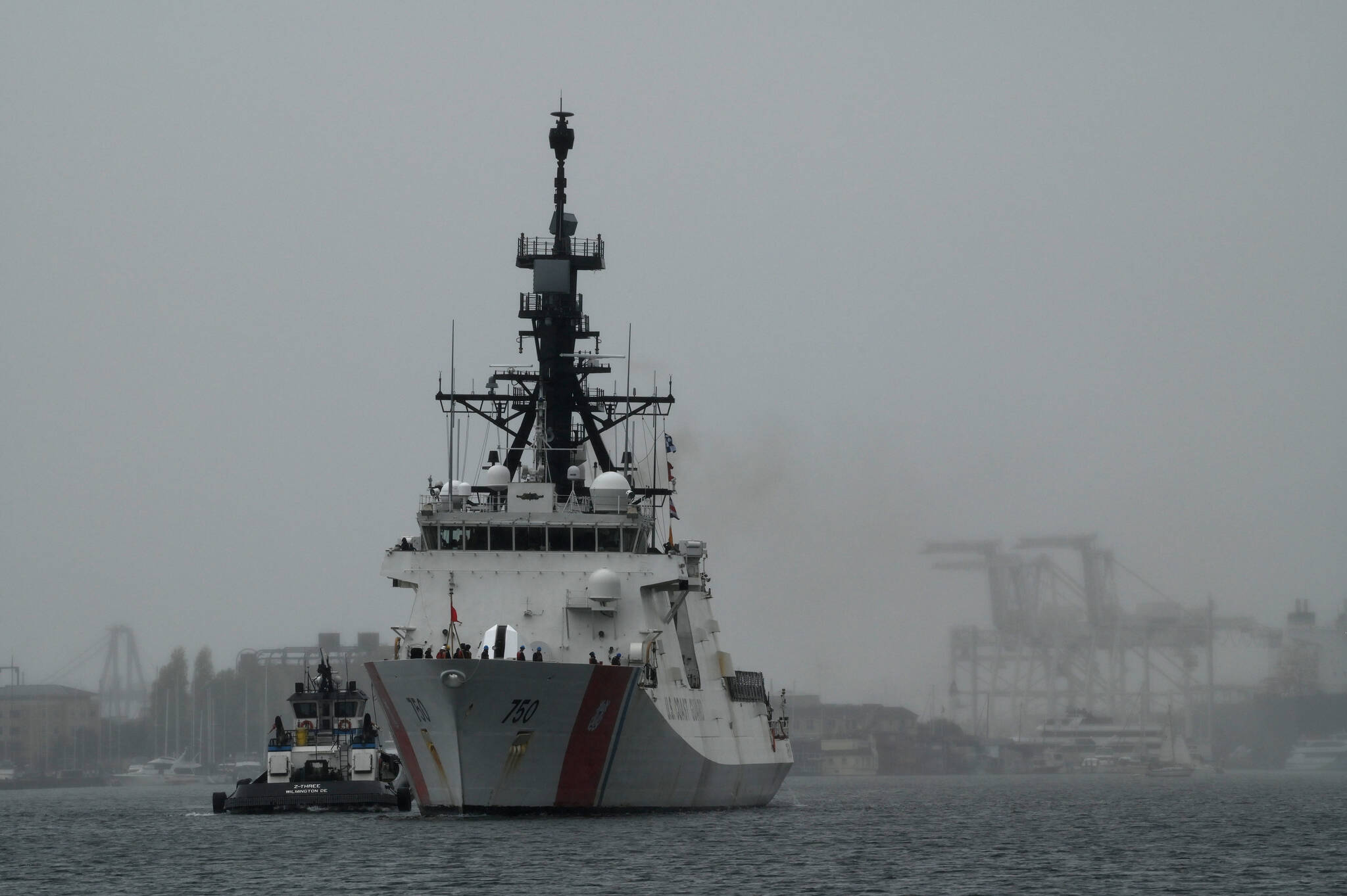Multiple vessels were targeted with fines as a result of enforcement by the Coast Guard Cutter Bertholf during an annual fisheries patrol last year.
The announcement comes as the Coast Guard’s annual fisheries patrol, North Pacific Guard, is about to occur once again.
“Everyone eats on the planet. Everyone needs food. Everyone needs fish. It’s a problem for everyone,” said Lt. Collin McClelland, who works in the international section of the Coast Guard District 17, coordinating the NPG patrols. “That is why it has become a priority for us: it is affecting national security and our national food safety.”
[Police seeking information on man missing near Echo Cove]
Four countries are participating in concert this year, McClelland said: The Canada, Japan, South Korea and the U.S. The U.S. may have the most visible contribution, deploying 418-foot National Security Cutters, like the Bertholf, and HC-130 Hercules aircraft, but other countries are heavily involved as well, McClelland said. Participating countries may provide shipriders to man boarding teams, aviation assets, or conducting patrols at sea with their own vessels, McClelland said.
“We basically provide a surface platform — our National Security Cutter — conducts the patrol with boat crews that can perform the boardings. That’s why we bring NOAA as well,” McClelland said. “It’s akin to bringing a platform to the table so everyone can participate. Those relationships are not exclusive. Japan might do a couple-day patrol in participation. It’s a collaborative effort between all of us.”
Patrols, both airborne and seaborne, will sail the high seas of the North Pacific, surveilling for potential violations of fisheries agreements set down by commissions like the North Pacific Fishing Commission, which is an international body composed of multiple states whose flagged vessels fish in the area, McClelland said.
“They’re cooperative organizations between Pacific Rim nations,” McClelland said. “I’d say they’re kind of akin to U.N. nations where they come together to agree on specific conservation and management measures.”
Prepare to board
Upon identifying possible violations of the rules of the regional fishing management organization, the cutter may board the vessel, McClelland said. Violations can be as simple as obscured signage on a vessel, or catching the wrong kind of fish using the wrong kind of gear, McClelland said.
“When we do find a potential violation, it’s always considered potential until the state and the RMFO decide it was a violation,” McClelland said.
For that reason, members of the National Oceanic and Atmospheric Administration’s Fisheries group accompany the patrols, lending their expertise to support the mission, McClelland said. Boarding teams will board vessels, document the potential violation, and have the ship’s master sign off their acknowledgement in the presence of a translator before returning to the cutter, McClelland. From there, the package with the complete write-up of the violation is passed on to the potential violator’s flag state.
“For the most part we leave it to the flag state to police their own. It’s a respect of sovereignty and all to encourage coordination as well,” McClelland said. “When you start to question a country’s sovereignty and how they enforce their fishing laws on their vessels, it could get hostile real quick.”
Eleven vessels refused to be boarded in 2021, according to a Coast Guard report. Those included 10 from the People’s Republic of China and one from Russia. This is itself a serious regulations violation, according to the report. Issues where vessels may not be compliant with RMFO regulations are handled at a higher level, McClelland said, generally between the foreign ministries of the nations.
“It is a very tactful approach to what we have to do. On one hand you don’t want to discourage countries, making them a pariah by making it super hard. On the other hand, there are mechanisms to hold them accountable,” McClelland said. “If we feel it wasn’t appropriate to what we detected, we can begin dialogues with the RMFO. That gets more pushed toward the State Department.”
Fines levied
Nearly $250,000 in fines were imposed for multiple vessels and officers by the Fisheries Agency of Taiwan as a result of the Bertholf’s actions, according to a Coast Guard news release.
“The success of the Bertholf’s patrol highlights the value of our ongoing international partnerships in protecting the food and economic security of coastal states across the globe,” said Vice Adm. Michael F. McAllister, the commander of Coast Guard Pacific Area. “The penalties imposed by the Fisheries Agency of Taiwan exemplify the collaborative approach and role of law enforcement in protecting the global food chain.”
The Bertholf and its crew were deployed to the region in late summer of 2021, boarding 15 different vessels and identifying 32 potential regulations violations under Western and Central Pacific Fisheries Commission and the North Pacific Fisheries Commission, the Empire previously reported.
The Fisheries Agency of Taiwan fined the operator of one vessel $203,190 and suspended the operator’s license for a month. The agency also targeted the captain specifically, fining them $40,600 and suspending their certification as a fishing vessel officer for a month, revoking their fishing vessel crew ID, and listing the vessel as a high-risk vessel subject to more stringent attention.
Just over $2,000 in fines were levied against several other operators and captains for illegal retention of salmon, as well as for improper vessel identification markings.
”This is a very serious mission for the Coast Guard, in the new commandant’s eye as well. It’s encouraging to see international participation as well,” McClelland said. “The Coast Guard does have plans to continue NPG operations.”
• Contact reporter Michael S. Lockett at (757) 621-1197 or mlockett@juneauempire.com.

